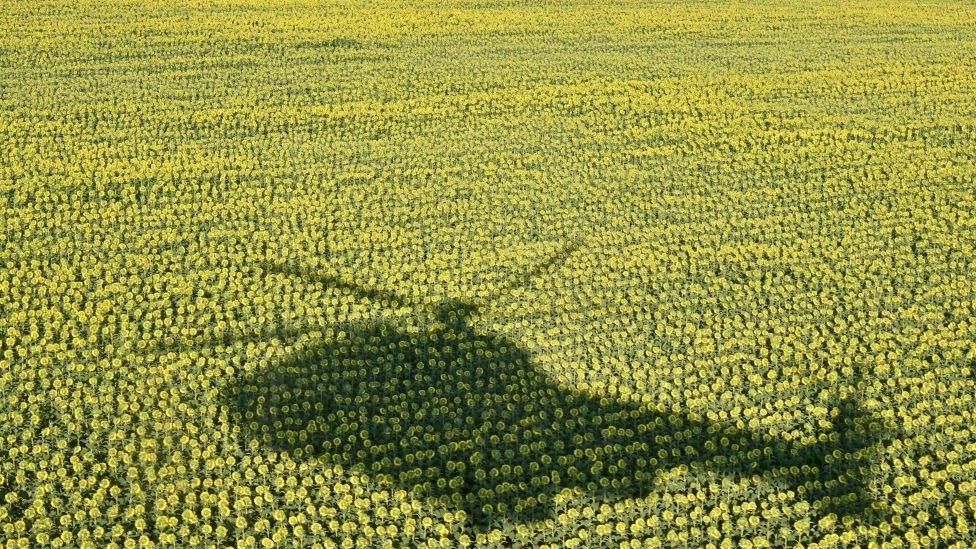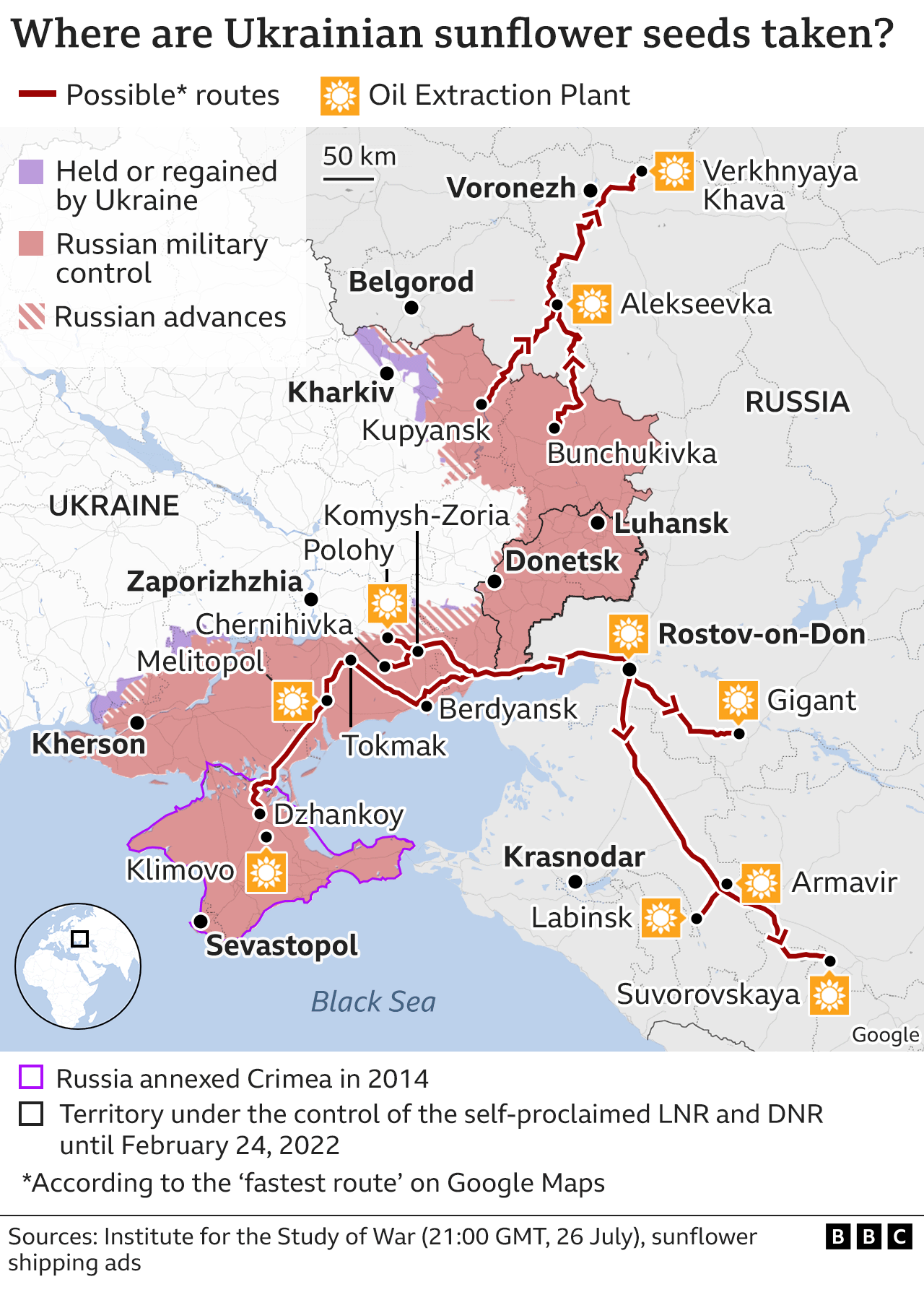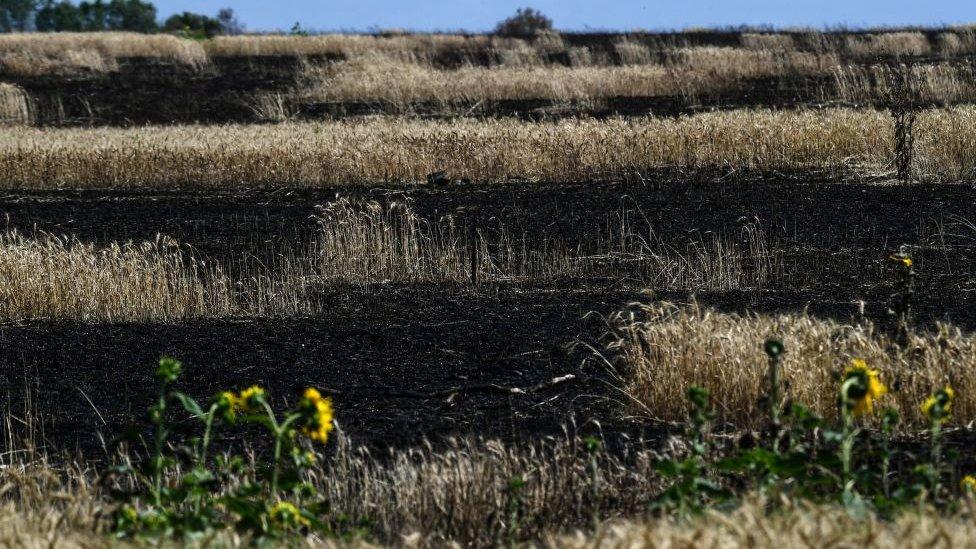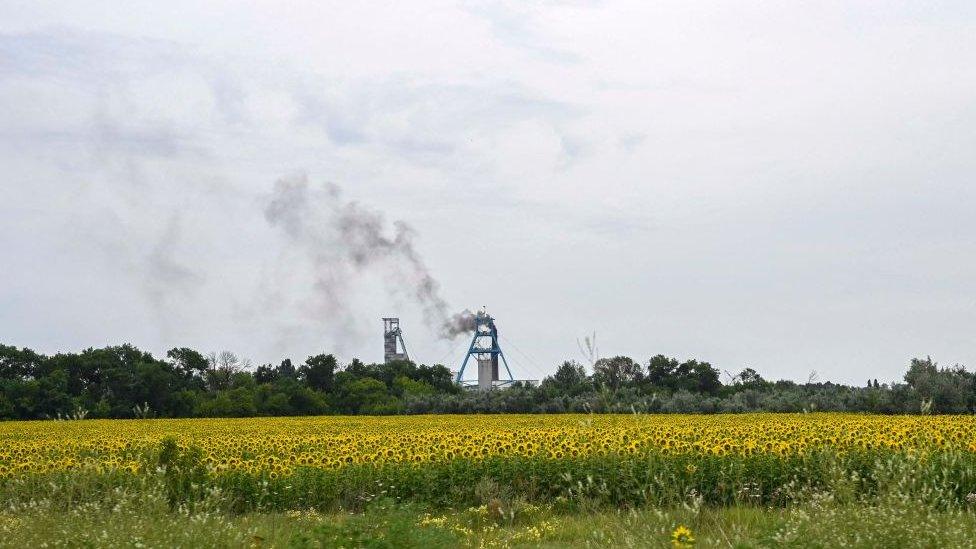Ukraine war: How Russia uses social media to steal sunflower seeds
- Published

Ukraine and Russia were the world's biggest sunflower seed exporters in 2021
The BBC has seen significant evidence that Russian forces in occupied areas of Ukraine have been systematically seizing not only Ukrainian grain, but also sunflower seeds from local farmers.
We have spoken to farmers who have lost their crops, and tracked messages in private and public social media groups showing how the seeds are transported from southern and eastern occupied parts of Ukraine to Russia.
The two countries were the world's biggest exporters of sunflower oil in 2021, with Ukraine selling 5.1 million tonnes of oil and Russia 3.1 million.
Now it appears that Russian oil is partially being produced from Ukrainian seeds, one of the symbols of the country's agriculture.
In a closed WhatsApp chat with about 500 participants, users placed orders to transport crops from occupied parts of Ukraine to Russia. Screenshots of the chat were shared with the BBC by one of its members.
"Seeds. From Chernihivka, Zaporizhzhia region [Ukraine] to Rostov-on-Don [Russia]. Large volumes," wrote one member on 18 July.

The BBC checked a dozen telephone numbers from the chat in online databases and found they belonged mainly to truck drivers or owners of small businesses related to cargo transportation.
Russians or those who co-operate with them also search for grain carriers in open Telegram chats. We spoke to them undercover, saying we owned several trucks.
Yelena, a Russian dispatcher who was looking for trucks to transport crops from southeast Ukraine, told us the "seeds weren't stolen".
"They're controlled by the [Russian-imposed] military-civilian administration. These transactions are transparent. The seeds have been purchased legally," she said.
Farmers we spoke to would question that: "They looted everything and took it away."
We contacted a farmer from an occupied region in southern Ukraine. He has since left the occupied territories but his employees are still there, so he asked for anonymity. He says Russian soldiers came to his warehouse and confiscated his crops in the end of May.
"We had 1,200 tonnes of sunflower seeds and 860 tonnes of wheat in our warehouse," he says. "And they [the Russians] looted everything. At first, they tried to be polite with our guard. They said: it's not us, it's the order given by our commander. But it wasn't clear where their commander was. They just pretended to be nice. They loaded all the harvest and took it away. And the guard, what could he do? They beat him."
The farmer says his crops were worth £700,000 ($856,000). He says he also lost nearly £1.5m worth of equipment.

Owners of small and medium-sized farms in the occupied areas of Ukraine are being forced to sell sunflower seeds at a reduced price
We have spoken to other farmers in the occupied Zaporizhzhia region who have been forced to sell sunflower seeds at a reduced price. Russians are offering £120 per tonne. The price before the war was £500-600.
The situation is the same in the occupied Kherson region in southern Ukraine, says Oleksandr Hordienko, head of the local farmers' association: "Farmers sell [seeds] because they need money to buy diesel, fuel, and fertilisers. But if they [Russians] continue to offer such a price, then there's no point in starting the next sowing season at all."
The main product made from the sunflower seeds is oil. All the messages and adverts the BBC saw on social media showed that the destination for trucks transporting Ukrainian seeds were oil extraction plants in Russia.
"We go to plants directly, we don't unload [seeds] at warehouses," said Viktor, who was looking for trucks to deliver crops from the occupied Kharkiv region.
Destinations mentioned included Verkhnyaya Khava, a village in Russia's southwestern Voronezh region, with a large oil extraction plant, and the village of Gigant, in Russia's western Rostov region, also home to a major Russian oil plant.

It appears that Russian oil is partially being produced from Ukrainian seeds, one of the symbols of the country's agriculture
It is also believed that Russia could be smuggling ready-made sunflower oil from Ukraine.
The head of the Farmers' Association in the Zaporizhzhia region, Valeriya Matviyenko, says the oil extraction plant in occupied Melitopol is being used to produce sunflower oil, which is then transported to Russia through Crimea.
"Processing is under way, and you can even smell it. There's such a nice flavour there, you can smell it even from a 3km distance," a local farmer told the BBC.
A woman who is still in occupied Melitopol has also confirmed she saw equipment moving in and out of the plant.
We made enquires to the owner of the Melitopol oil extraction plant, Serhii Zhelev. He told us that the plant was not operating. When we asked him about local claims it had been occupied and was now operated by Russian forces, he hung up.

War in Ukraine: More coverage
ON THE GROUND: Ukraine's shadow army
READ MORE: Full coverage of the crisis, external
